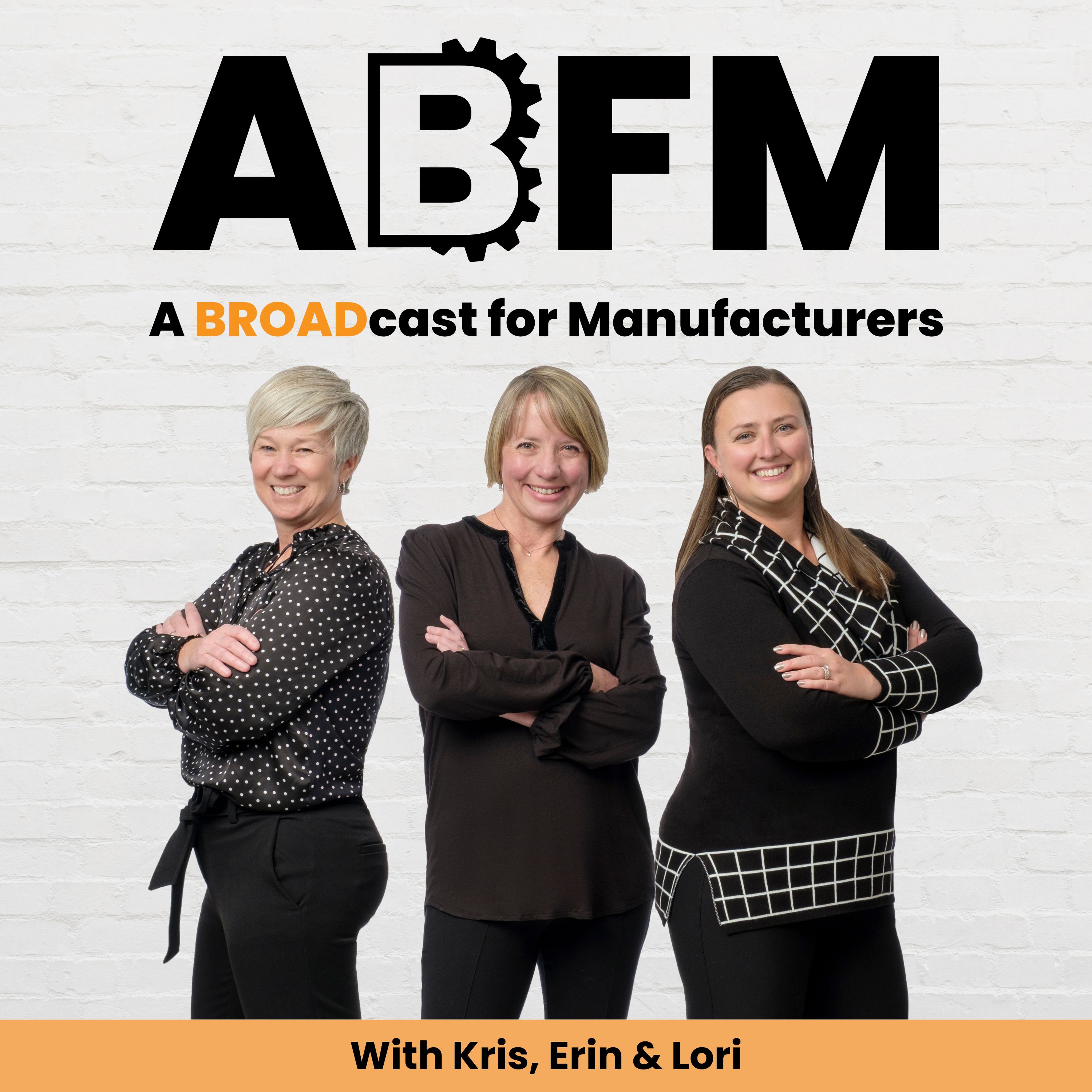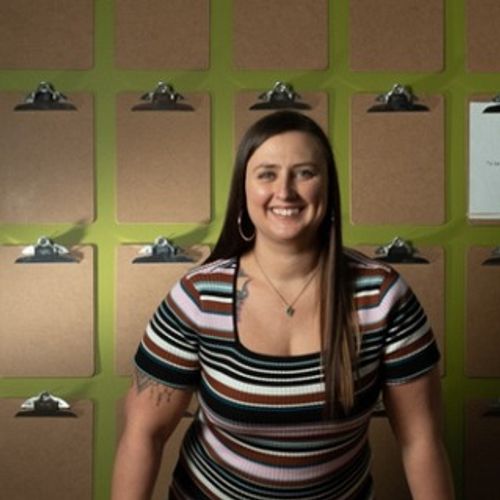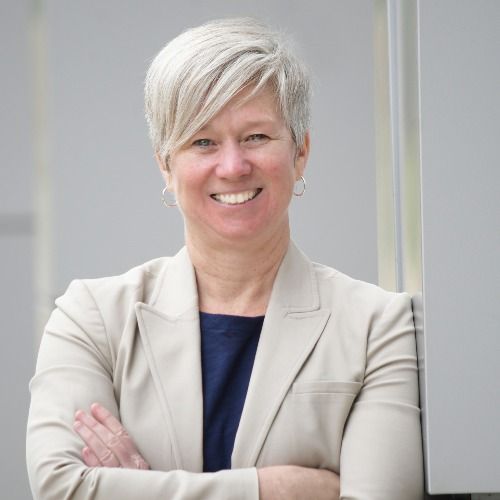Episode 7
07: Addressing The Labor Shortage In Manufacturing
Erin: I happened to come across this really interesting piece that examines a regional phenomenon where the manufacturing industry is just doing really well, however, the labor shortage has been a real challenge for those folks and across the country. The piece did a nice exploration of all the factors that are really limiting hiring in the manufacturing industry and I thought we'd just kind of talk about that today because that's on everybody's minds.
Lori: What really struck me in the article was that Southeast Pennsylvania has over 10,000 manufacturing positions that go unfilled every year!
Erin: That just slows things down across the board, because anytime somebody has to be absent, you're just not able to fill that gap which puts so much pressure on the folks that are there. One of the things they explored was this sort of impression impairment for the manufacturing industry. They're saying that people when they think about manufacturing, think that it's dirty, it's loud, so it's not a good job. The article unpacks that notion and I just thought they did a really neat job of sort of dispelling those myths, but also helping us understand why they exist in the first place.
Kris: I found it really interesting when the gentleman that they interviewed who has now been in manufacturing for 16 years said, "I thought manufacturing was dirty," and then he said, "Having been in a manufacturer for mining equipment for many years, I never got dirty!" So really, the stigma and the belief that people have about manufacturing is still something that has to be overcome and I think that's one of the many challenges that they're facing, but I thought that was so interesting that I really connected with his feedback there.
Erin: You know what's funny is that it's a stigma now, but in the past, getting dirty used to be a point of pride to show hard work in the manufacturing industry. Still, for many folks that are still in the manufacturing industry that still exists and it's hard to contribute to this sort of fixing the impression of manufacturing as not being dirty, because it's a point of pride, and that's a huge cultural transition.
Kris: I do think there is value that you gain and you feel from that accomplishment of doing the hard work that sometimes does make you dirty. I think it all has to be unpacked to try to find the right people with the right skills for the right jobs because there are all kinds of different jobs. In the article, it says that they've been stressing the importance of working closely with local high schools, trade schools, and colleges to get more young people involved with the industry and to buck the stigma of manufacturing work as undesirable. Here's my question to you guys: Is that the solution or is there something else?
Erin: So Kris and I are planning an event at the Ford Festival which celebrates innovation, entrepreneurship and technology. We'll be working with some local manufacturers to do a panel on entrepreneurship and manufacturing which will get at a solution where we train young people and then they'll go work for somebody, but they're a lot of young people who are excited about being entrepreneurs, and we have not made the connection that you can make things and be an entrepreneur.
Lori: I'd say get in at a younger age because there's a lot of stress when someone's in high school and they have to make these major decisions with no information. I wish that the educational system did a better job of leaning into someone's personal interests to guide them down a path that creates long-term success for their career.
And so much more!
Connect with the broads!
Connect with Erin on LinkedIn and visit http://www.earthlinginteractive.com for web-based solutions to your complex business problems!
Connect with Lori on LinkedIn and visit www.keystoneclick.com for your strategic digital marketing needs!
Connect with Kris on LinkedIn and visit www.genalpha.com for OEM and aftermarket digital solutions!
Transcript
Hey, ladies. Hey, whoa, whoa, it's Friday. I can say that right? It's Friday.
Lori Highby:Friday, I was scrolling through my Facebook, which I usually do every morning. What am I? Connections she's training to be a what is the
Lori Highby:she had to do is give up drinking, which she she loves whiskey so she's doing this really interesting thing. Every week when she goes to the store,
Lori Highby:house she started posting this and it just got me thinking like, Wow, there's so many out there that I haven't tried, obviously. But so I'm
Kris:I don't have one. I you know, whenever I go to a restaurant and I order my old fashion, I do like a whiskey old fashioned but I always ask
Kris:thing to do is just to mix it up and hear what and there's so many different takes on an old fashion today. So typically on the menu there is
Erin:Wow, you go whiskey Hill fashion now for our listeners that are not located in Wisconsin. old fashions. They practically come out of the tap. I
Lori Highby:They have a Montana
Erin:you got Oh, field trip. Yeah, I tend to like mine. sour fruit. And they go brandy. I like my whiskey straight. Nice. So um, yeah. What about
Lori Highby:like I do whiskey or bourbon or rice.
Erin:All the above? Yeah.
Lori Highby:I like I'm sour. But I prefer green olives in mine.
Kris:Wow. Yeah, I'm sweet with the fruit.
Erin:Today we don't have a guest so let's mix it up and have a conversation about something that's kind of topical and in the news and I
Erin:Yeah. I think if it's, if it's not on their mind, it should be for sure. But I think it's very topical right now. So great article, Aaron.
Erin:well, however, the labor shortage has been a real challenge for those folks and across the country. The piece did a nice exploration of all the factors
Erin:minds.
Lori Highby:Yeah. I enjoyed reading it. And, and you're right. It's not just in the Pennsylvania region. There it is. That's national, and probably
Lori Highby:Pennsylvania has over 10,000 manufacturing positions that go unfilled every year!
Erin:every year on jobs annually.
Kris:Can you imagine that? I mean, oh, it's hard to get behind.
Lori Highby:Yeah. It attributes to the supply chain issues that we have, you know, as people have the orders, the companies have the orders, which
Erin:That just slows things down across the board, because anytime somebody has to be absent, you're just not able to fill that gap whic puts
Erin:issues, but they really did a deep dive. One of the things they explored was this sort of the attitude or impression impairment for the
Erin:not a good job, and so forth. The article unpacks that notion and I just thought they did a really neat job of sort of dispelling those myths, but
Kris:I found it really interesting when the gentleman that they interviewed who has now been in manufacturing for 16 years, he said, "I
Kris:years, I never got dirty!" So really, the stigma and the belief that people have about manufacturing is still something that has to be overcome and I
Erin:You know what's funny is that it's a stigma now, but in the past, getting dirty used to be a point of pride to show hard work in the
Erin:there.
Erin:to contribute to this sort of fixing the impression of manufacturing as not being dirty, because it's a point of pride, and that's a huge cultural
Kris:I do think there is value that you gain and you feel from that accomplishment of doing the hard work that sometimes does make you dirty. I
Kris:jobs, but just to think of the entire industry as one thing would be incorrect. It
Erin:would be incorrect. And it also it ends up being an excuse, you know, we can't hire people because they don't want to get dirty, or we can't hire
Erin:industry anymore? That's,
Lori Highby:yeah, yeah. Well,
Kris:In the article, it says that they've been stressing the importance of working closely with local high schools, trade schools and colleges to get
Kris:a solution? Because I feel like that's what's been talked about for the 20 years that I've ever been in manufacturing. So is that the solution or is
Erin:That's a great question, Kris and I'm planning an event in August, and it's part of something called the Ford Festival in Madison, Wisconsin,
Erin:panel on entrepreneurship and manufacturing. And I think my point is it gets at that where we've had this solution where we train young people and
Erin:that you can make things and be an entrepreneur. I think that's one of the missing links to get to your question. Like, it's important, but no, it is
Kris:shops open. In one region, right? So yes,
Lori Highby:I'm gonna say yes, and no! I would say get in at a younger age, instead of near the end of someone's schooling career, because I think
Lori Highby:anything, planting this seed at a younger stage, in the education system, that's really sharing all the different opportunities for any sort of a
Lori Highby:taking home economics courses, and then taking shop classes and some other things, which is really fascinating to me, but it was just this short,
Lori Highby:to school? We're going to school to set ourselves up for future success. So why isn't this future success focused on really creating some opportunities
Lori Highby:educational systems would do a better job of really leaning into someone's personal interests to help guide them down a path that's going to be a long
Erin:Yeah, I agree. And I think one of the things that's been problematic historically, for the manufacturing industry, is this binary that's been
Erin:that there's there was sort of an implicit, let's just call it bias in that little just like, oh, here, trial homework and try out some shop and then
Erin:your time? What are you good at what you can, what can you do into the into the future with those natural skills and interests that you have? And that
Erin:Again, there was a certain pride, like, I didn't take that path. There's a college path. And there's all these things in stereotypes associated with
Erin:this choice. And as long as we have that binary and the judgment along with whichever one you take, I think that's going to continue to be problematic
Kris:Yeah, no, I I really appreciate the the things that both of you are saying. I would just add that I really think that manufacturing needs
Kris:customers, we have to start doing at the the entire field of manufacturing, needs marketing to talk about the benefits that come with being an employee
Kris:here locally, and I was working on the shop floor I had great benefits, profit sharing. I had an interesting schedule. Sometimes I'd work for 12
Kris:these were broadly known things that you would get in your manufacturing career and I loved it, the day went by fast. You know, it was good work, I
Kris:attributes about a person's makeup, to your point earlier, Laurie earlier in their in their life, and, and kind of show them that these are the types
Kris:the idea of just an influencer group out there, really raising the voice of manufacturing. And I think that's what it needs and needs.
Erin:I think that you're exactly right, and getting back to, you know, beating the culture drum. For younger people, social media, and seeing and
Erin:great day, I'm making this amount of money, and you know, all those things can really help move more people into that pipeline. But it needs to be
Erin:recruiting department might not be encouraging younger employees, like, Hey, can you help us get the word out, that might be something that could
Erin:how younger people share their ideas.
Lori Highby:That's right, you need the champions, from all all backgrounds, all the diversity to really be championing either a brand or
Lori Highby:opportunities that are available.
Kris:It is urgent, right? Because of the silver tsunami. Right.
Lori Highby:I love that phrase.
Kris:Well, it's new to me, so I had to learn something new this morning. Yeah, well,
Erin:we getting back to that article. And they made mentioned again, in that in the region of the Delaware Valley, 30% of the manufacturing
Erin:with that retirement are going to be more open positions. Also a very substantial loss in institutional knowledge. So looking for ways to
Erin:to do is to sort of bring what we know, into the future, and also establish a horizon that we can all move towards, to make manufacturing strong in the
Kris:And we need to start capturing the information, the knowledge of, you know, this silver tsunami group as they start to exit, you know, I have
Kris:that's a big gap to fill, they have a lot of information, it's it's in their head, or it's in the materials that they work around, but it needs to
Lori Highby:You know, honesty ties into your point earlier about marketing, because these are it's storytelling, that's what they need to do
Lori Highby:younger crowd coming in as far as this is an amazing opportunity but also transfer that knowledge and you know, you can do the lessons they've
Lori Highby:these amazing individuals who have served their time and and are due for their retirement. Yes,
Erin:yeah. Yeah, I think I think that's that let's make that something that we attempt to do here on this show. Let's look for if anybody's
Erin:those early adopters, that early entry into manufacturing that aren't a traditional, what we think of as a traditional manufacturer, let us know.
Lori Highby:Well,
Erin:thank you both so much for this conversation.
Lori Highby:I think you're in the article.
Kris:Yeah. Thank you. It was a great article.
Erin:We'll put that link in the show notes. I think there's a lot to get out of that. And we'll be touching on these topics, obviously, again, going




